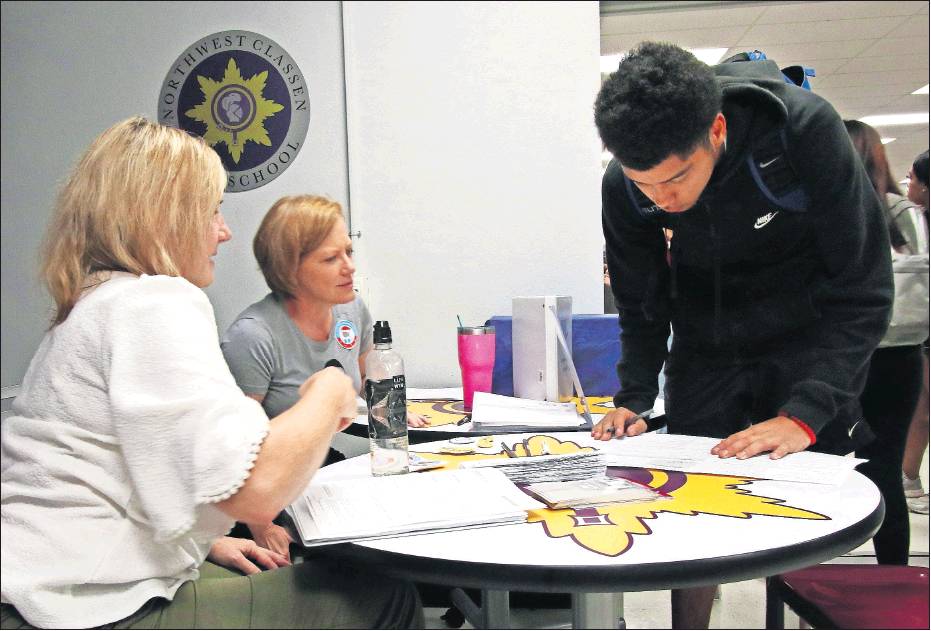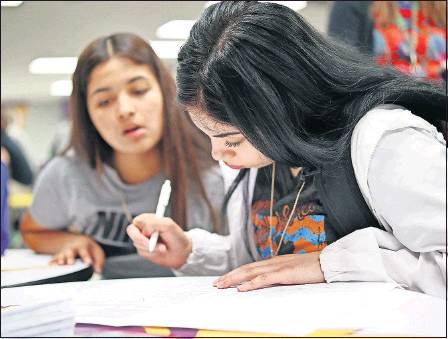Registering the youngest voters
Nonprofit registrants work with OKC schools on ‘action civics’ initiative
By Carmen Forman
Staff writer cforman@oklahoman.com
Anational nonprofit with local ties is educating Oklahoma City Public Schools students on how they can effect change in state and local government.
The discussion includes registering to vote.
The Oklahoma affiliate of Generation Citizen deployed 25 volunteers last week to all of the city’s public high schools to register new voters as part of the organization’s broader push to teach students about how local and state government works and how they can get involved in the process.
“They’re learning how to not just sit back and let things happen to them, but to jump in,” said Amy Curran, executive director of Generation Citizen Oklahoma.
Volunteers trained by the League of Women Voters registered 290 new voters with lots of other students taking home voter registration forms. The voter registration drive was part of High School Voter Registration Week.
“Every vote is critical,” said Yasmine Haynes, a student at Northwest Classen High School.
Some people always are upset about whoever is elected, but you can't really be upset if you didn't vote, she said.
Young voters turn out to vote at far lower rates than the overall turnout rate. Youth voter turnout also historically lags that of other age groups.
But that trend could be changing.
In 2018, young Oklahomans voted at nearly twice the rate they did in the 2014 midterm elections. In Oklahoma, 21% of people between 18 and 24 showed up to vote in 2018, compared to just 11% in 2014.
Mirroring trends across all age ranges, youth voter turnout also is tends to be higher in presidential elections.
Angel Little, another Northwest Classen student, is eager to vote in the 2020 presidential election. She first took notice of politics and elections when former President Barack Obama was seeking reelection.
“I’ve been so excited to vote since then, and now I’m 18 and it’s happening,” she said with glee after registering to vote during her lunch hour Wednesday.
But Generation Citizen’s work in local schools didn’t end after this week’s voter registration drive.
The nonprofit has a three-year partnership with Oklahoma City Public Schools as part of a $1.1 million grant for the group to work with local middle and high school students. Also involved in the partnership is the Center for Information & Research on Civic Learning and Engagement at Tufts University.
Generation Citizen teaches students “action civics” or learning about government by participating in local policy issues.
Students learn about how government works, but their classes often focus on the federal government and not how government works closer to home, Curran said.
“Oklahoma has unique ways of doing things so it doesn’t always translate if you know how the federal system works to how local things work,” she said.
Generation Citizen’s work starts when students are in seventh and 10th grades and culminates in a government class for high school seniors focused on teaching students about government through a local policy lens.
Students learn about their local school board and city council. They also write legislation to change Oklahoma laws. Last year, one student's bill — a measure to train teachers how to spot the signs of human trafficking — passed the Legislature and was signed into law.
Curran hopes Generation Citizen can eventually spread its intensive civics education program across the state. For now, the group's partnership with Oklahoma City Public Schools, the state's largest school district, serves as a sort of pilot program.
“Public schools are there to help move students into colleges and careers,” she said. “They’re also there to move them into civic life and ensure that wherever students end up, they’re knowledgeable and able to participate in improving and making sure their community is a place where they and their families can thrive.”

